Economy
Fitch sees modest margin recovery for Turkish banks as rate cuts loom
Türkiye’s banking sector may see a gradual recovery in net interest margins by the end of the year, aided by anticipated monetary easing from the country’s central bank, according to Fitch Ratings.
Ahmet Emre Kılınç, director of banks at Fitch, said on Tuesday that the credit ratings agency now projects the Central Bank of the Republic of Türkiye (CBRT) to lower its benchmark interest rate to 33% by year-end.
“As a result, we expect an improvement in banks’ net interest margins, although this recovery will be somewhat more modest compared to our initial projections at the beginning of the year,” Kılınç told Anadolu Agency (AA).
The CBRT pivoted to raising its key policy rate by 350 basis points in April to 46% and pushed the overnight lending rate to 49% after Turkish assets and the lira fell sharply after Istanbul Mayor Ekrem Imamoğlu was jailed pending trial over graft charges.
Before that, the bank had begun an easing cycle and gradually cut its one-week repo rate to 42.5% in March as inflation fell from the level of more than 75% that it reached in May 2024.
A sharper-than-anticipated slowdown in annual inflation to 35.41% has reignited speculation that the bank could resume rate cuts as early as this month.
The outlook for Turkish banks is shaped by domestic market developments and the impact of global customs tariffs, Kılınç said.
Before March, he noted, there was an expectation that continued rate cuts would support banks’ interest margins, but this has been somewhat delayed due to volatility in the domestic market.
Eyes on policy path
While the CBRT has signaled a cautious approach, analysts say the decline in inflation has provided some additional room for the bank to resume the rate cuts. Any shift, however, will likely be contingent on whether the overnight lending rate converges with the policy rate in the coming weeks.
The CBRT’s next monetary policy committee (MPC) meeting is scheduled for June 19, followed by another on July 24.
Last month, the bank kept its inflation forecast steady in its quarterly report, saying upward and downward risks balance out. Governor Fatih Karahan said the bank is ready to tighten policy if inflation worsens.
The bank’s year-end mid-point estimate stands at 24%, with an upper band of 29%. Turkish officials continue to emphasize that inflation will remain within this forecast band. Market surveys see a higher rate of around 30%, though estimates have recently been revised down modestly.
Kılınç highlighted that the persistence of high interest rates leads to increased risk costs.
“We have begun to closely monitor banks’ asset quality for the second half of the year. Currently, we believe that the risks to asset quality remain manageable for banks. In this regard, we maintain our neutral outlook for Turkish banks from the beginning of the year,” he said.
Fitch’s operating environment score for the Turkish banking sector remains positive, and the agency is keeping it unchanged, according to Kılınç.
“Profitability could improve this year. However, recent market volatility has somewhat disrupted the positive trajectory. Due to this volatility, Türkiye’s five-year credit default swap (CDS) had risen, but has since declined again to around 300 basis points,” he added.
External financing access remains intact
Despite concerns over short-term external debt levels, Turkish banks have retained strong access to foreign financing, according to Kılınç.
He pointed out that the high level of short-term external debt poses a refinancing risk, though he emphasized that this is not a new concern.
“Last year, market access was strong, with many banks issuing both Eurobonds and subordinated loans. Since March, syndication loans have been renewed at rates exceeding 100%, indicating that banks continue to secure external financing,” Kılınç said.
“However, long-term bond issuances have slowed, with costs being a key factor. In this context, banks are likely to wait for a more favorable environment before proceeding with further issuances.”
Kılınç also mentioned that global developments, including U.S. interest rate policy, geopolitical risks, and tariffs, could indirectly impact the outlook for Turkish banks. However, he emphasized that tariffs were unlikely to have a significant direct effect on Turkish financial institutions.
Economy
Şimşek touts Türkiye’s ‘resilience’ despite global economic uncertainty
Türkiye has remained economically resilient despite mounting global uncertainty, underpinned by free trade agreements, strong service exports and an ongoing reform agenda, Finance Minister Mehmet Şimşek said on Monday.
Şimşek, speaking at the Conference for Emerging Market Economies in Saudi Arabia, described last year as a challenging period for the global economy marked by “volatility, uncertainty, complexity, and ambiguity.”
“It’s been a difficult year with heightened uncertainty, in particular for emerging markets,” he said.
Şimşek said Türkiye is relatively resilient to global trade fragmentation, noting that about 62% of its exports are covered by the EU Customs Union and free trade pacts with 27 countries.
While not fully immune, these agreements provide partial protection, and the rest of trade is largely concentrated in nearby regions such as the Middle East, North Africa, and Central Asia.
He said Türkiye ranks among the world’s top 20 in services trade, highlighting its position as fourth in tourism and a global leader in construction and TV series exports. He stressed that services have so far been less affected by protectionism than goods, giving Türkiye an edge, and said the government is prioritizing the sector for its high added value and job creation potential.
Şimşek says Türkiye also prioritizes and invests in the field of artificial intelligence, and stated that along with infrastructure investments, they attach importance to the human capital dimension, skills development, and education.
Şimşek explained that they are also focusing on regional integration, stating that connectivity is a part of this, and that they are building new corridors.
He said Türkiye sits on the Middle Corridor from Beijing to London and is working on new routes linking the Gulf to global markets via Türkiye, adding that boosting connectivity is central to the strategy, alongside energy investments, including plans to build two or three additional nuclear power plants in the coming decades to meet rising demand driven by AI.
Economy
Ex-Prince Andrew appears to have shared UK trade files with Epstein
Andrew Mountbatten-Windsor, the younger brother of King Charles, shared confidential British trade documents with Jeffrey Epstein in 2010, leaking information to the late sex offender during his tenure as a government envoy, emails appear to show.
The former prince, 65, has faced years of scrutiny over his friendship with Epstein, a relationship that has cost him his role in the royal family, titles and home. Andrew has always denied any wrongdoing and not responded to requests for comment since the latest release of Epstein files.
In the latest batch of files released in the U.S., emails appear to show that Andrew forwarded to Epstein reports about Vietnam, Singapore and other places, which he had been sent in relation to a trip he made in an official capacity.
It was not immediately clear whether authorities were planning to open an investigation into Andrew’s sharing of information.
Trade envoys are usually barred from sharing sensitive or commercial documents under confidentiality rules.
Over the last 10 days, revelations from the Epstein files have engulfed British Prime Minister Keir Starmer in the biggest crisis of his premiership, after he appointed an acquaintance of Epstein, Peter Mandelson, as ambassador to the United States.
Like Andrew, it appears that Mandelson also shared sensitive government files from 2009 and 2010 with Epstein, and police are investigating claims of misconduct in public office.
Thames Valley Police said last week they were reviewing a new allegation against Andrew involving a woman being taken to an address in Windsor in light of the latest Epstein files.
Mountbatten-Windsor, the second son of the late Queen Elizabeth, was forced to quit all official royal duties in 2019 and, last October, Charles removed his title of prince. Andrew was moved out of his royal mansion last week.
Economy
UK borrowing costs up as investors question Starmer’s future
British government bond yields surged early on Monday as investors continued to weigh the political future of Prime Minister Keir Starmer amid the fallout from the Epstein crisis, although they later eased to move more in line with U.S. Treasuries.
Starmer’s chief of staff, Morgan McSweeney, quit on Sunday, saying he took responsibility for advising Starmer to appoint Peter Mandelson as ambassador to the U.S. despite his known links to Jeffrey Epstein.
Some in Starmer’s Labor Party are openly questioning his judgment and his future, and investors are increasingly bracing for a challenge to his leadership, raising uncertainty over the path of British fiscal policy.
On Monday, Starmer’s director of communications, Tim Allan, also resigned.
The 10-year gilt yield rose to a high of 4.554% at 08:21 a.m. GMT, up 4 basis points on the day, before easing to 4.533%, in line with a rise in 10-year U.S. Treasuries. Long-dated gilt yields, most sensitive to worries over the budget outlook, rose by similar amounts.
“The decision by his most senior adviser to fall on his sword may buy Starmer some time, but signs of widespread discontent on the backbench, compounded by diabolically bad poll results, are creating the impression that his days are numbered,” said Benjamin Picton, senior market strategist at Rabobank.
On Feb. 5, when there was a previous bout of concerns about Starmer’s future, 10-year gilt yields rose to their highest since Nov. 20 at 4.605% before retreating sharply after the Bank of England (BoE) came closer than expected to cutting interest rates in that day’s decision.
However, gilt auctions in recent weeks have shown exceptionally strong levels of demand. The sale of a five-year gilt due on Tuesday will provide the next test of investor appetite. Economic growth data on Thursday could also move the market.
Economy
Türkiye stops chicken exports after pre-Ramadan price hikes
Türkiye has decided to suspend chicken meat exports ahead of the Muslim holy month of Ramadan in a bid to stabilize domestic prices and prevent what authorities described as unjustified increases that could strain consumers.
The decision came after domestic poultry producers and sellers raised prices by as much as 15% before Ramadan, prompting the government to intervene to protect the domestic market.
The Trade Ministry said the decision aimed to support the supply-demand balance and curb volatility in food prices.
Ramadan is a month when Muslims are united in a ritual of daily fasting from dawn to sunset. This year’s Ramadan is due to start next week.
For Muslims, it’s a time of increased worship, religious reflection, charity and good deeds. Socially, it often brings families and friends together in festive gatherings around meals to break their fast.
Türkiye frequently takes temporary trade measures ahead of Ramadan, when food demand typically rises, to contain inflation and ensure a stable supply of essential goods.
Annual inflation in Türkiye has been gradually easing and lastly dipped to 30.65% in January. Still, food has been one of the main contributors to rising prices.
In a statement, the Trade Ministry said recent regional developments affecting food markets, combined with rising domestic demand and seasonal shifts in consumption patterns, have accelerated price movements in certain product groups, including poultry.
“Price developments in the poultry meat market have been closely monitored, and it has been carefully assessed whether price formation has remained within the framework of normal market conditions,” the ministry said.
“Within this framework, as a step to support the supply-demand balance in the market, measures to suspend poultry meat exports have been implemented as of today.”
The ministry added that “any practice or speculative pricing behavior that could victimize our consumers or disrupt market mechanisms through exorbitant price exploitation is being closely monitored,” noting that the necessary inspection and sanction processes were being carried out with “determination.”
Ramadan is the ninth month of the Islamic lunar calendar; the month cycles through the seasons.
The start of the month traditionally depends on the sighting of the crescent moon. This year, the first day is expected to be on Feb. 19.
Fasting is one of the Five Pillars of Islam, along with the profession of faith, prayer, almsgiving and pilgrimage.
Muslims see various meanings and lessons in observing the fast.
It’s regarded as an act of worship to attain God-conscious piety and one of submission to God. The devout see benefits, including practicing self-restraint, growing closer to God, cultivating gratitude and empathizing with people who are poor and hungry.
The daily fast in Ramadan includes abstaining from all food and drink – not even a sip of water is allowed – from dawn to sunset before breaking the fast in a meal known as “iftar” in Arabic.
Economy
After landslide win, Japan’s Takaichi may struggle to soothe markets
Japanese stocks rose to hit record highs on Monday after Prime Minister Sanae Takaichi’s landslide election win; however, experts warn that the country’s first woman leader could struggle to keep both voters and markets happy.
In its best result since its founding in 1955, Takaichi’s conservative Liberal Democratic Party (LDP) won a two-thirds majority in Sunday’s snap lower house election, according to Japanese media.
With the result, Takaichi, 64, managed to capitalize on her strong popularity since taking the helm of a moribund LDP in October and becoming Japan’s fifth premier in five years.
On Monday, the Nikkei 225 briefly jumped more than 5% to pass 57,000 points for the first time, while the yen strengthened against the dollar.
Analyst Kyle Rodda of Capital.com said the victory handed Takaichi “the mandate she was looking for for her big-spending agenda.”
Equities are “poised to benefit from higher fiscal spending but interest rates that remain accommodative and negative in real terms,” he said.
And SPI Asset Management’s Stephen Innes said: “Politically, the win hands… Takaichi’s freedom of movement and removes the need to bargain every decision down to the lowest common denominator.”
But a major reason for voters deserting the party in past elections was inflation, an unwelcome phenomenon for households after several decades of stable or falling prices.
The cost of rice, for example, doubled in 2025.
Food tax
After a $135-billion stimulus last year, economists said Takaichi’s room for manoeuvre was limited because of market concerns about Japan’s debt, which at more than twice the size of gross domestic product (GDP) is at a higher ratio than any other major economy.
The yen has also weakened, prompting speculation that Japanese authorities – potentially in partnership with U.S. officials – might intervene to provide support.
Off-the-cuff remarks by Takaichi earlier this month talking up the benefits for Japanese exporters of a weaker yen added to pressure on the currency.
In the election campaign, Takaichi floated the idea of suspending a consumption tax on food items, but this sent yields on long-term Japanese bonds to record levels.
On Sunday, she told local media further discussions were needed on such a move, which Bloomberg News reported would cost 5 trillion yen ($32 billion) in lost annual revenue.
“Most parties are in favor of reducing the consumption tax… I strongly want to call for the establishment of a supra-party forum to speed up discussion on this, as it is a big issue,” Takaichi said.
She also reiterated her mantra of having a “responsible and proactive” fiscal policy.
But she added: “We will ensure necessary investments. Public and private sectors must invest. We will build a strong and resilient economy.”
‘Betrayed’
Tetsuo Kotani at the Japan Institute of International Affairs said Takaichi could struggle to keep voters happy and that they could end up feeling “betrayed.”
“In reality, the policies of a Takaichi administration are unlikely to curb the inflation that voters expect her to address,” he warned.
“An income tax hike linked to increased defense spending will also be unavoidable. If these policies lead to a triple decline in stocks, the yen, and government bonds, people’s lives will become even more difficult.”
Takaichi has also pledged to increase defense spending as part of commitments to U.S. President Donald Trump that Japan will be less reliant on Washington.
Kotani said that because of a personnel shortage, linked to Japan’s low birth rate, this will “not amount to a fundamental strengthening of Japan’s defense capabilities.”
Marcel Thieliant at Capital Economics added that he did not expect Takaichi to embark on any new major spending splurges or tax cuts.
“(We) view the recent fiscal expansion as an attempt to bolster public support ahead of the election rather than as a sign of things to come,” he said in a note.
“With Upper House elections not due until 2028, we don’t expect any further major fiscal loosening.”
Hiroshi Shiratori, a politics professor of Hosei University, said Takaichi wanted to emulate the “Abenomics” of former premier Shinzo Abe – her mentor – of big spending and lower interest rates.
“But Abemonics was done at the time of deflation in Japan and a higher yen,” Shiratori said.
“Now is the time of inflation, and the cheaper yen exacerbating inflation, with the market reacting to worries over potential worsening of fiscal conditions,” he said.
“But not all voters understand this logic.”
Economy
Facing US tariffs, South Africa steps toward trade deal with China
China and South Africa inked a framework agreement for a new trade deal on Friday as Africa’s leading economy increasingly weighs other options following the steep import tariffs imposed on it by the U.S. and its diplomatic fallout with the Trump administration.
South Africa’s Ministry of Trade and Industry said the agreement would start negotiations over a deal that would give some South African goods, such as fruit, duty-free access to the Chinese market. The ministry said it expected the trade deal to be finalized by the end of March.
In return, the trade ministry said China will get enhanced investment opportunities in South Africa, where its car sales have seen rapid growth.
The U.S. slapped 30% duties on some South African goods under U.S. President Donald Trump’s reciprocal tariffs policy, one of the higher rates applied across the world. South Africa has said it is still negotiating with the U.S. for a better deal.
The China-South Africa deal follows others looking for alternatives to U.S. partnership in the face of Trump’s aggressive trade policies.
The announcement on the negotiations between China and South Africa came days after Trump issued a short-term renewal of a longstanding free-trade agreement between the U.S. and African nations. The U.S. extended the African Growth and Opportunity Act, which South Africa is a major beneficiary of, just until the end of the year and indicated it would be modified to fit the administration’s America First policy.
China is already South Africa’s largest trade partner for both imports and exports, while Chinese economic influence across the African continent continues to grow and it dominates in the extraction of Africa’s critical minerals that are key components for new high-tech products.
“South Africa looks forward to working with China in a friendly, pragmatic and flexible manner,” the trade ministry said.
Trade and Industry Minister Parks Tau, who traveled to China to sign the agreement, said the deal would benefit South Africa’s mining, agriculture, renewable energy and technology sectors.
U.S.-South Africa diplomatic ties have plunged to their worst point in decades after the Trump administration accused South Africa of pursuing an anti-American foreign policy and allowing the violent persecution of a white minority group at home. South Africa’s government has denied allegations that white Afrikaner farmers are being killed in a widespread effort to seize their land as baseless.
Trump has also barred South Africa from taking part in meetings of the Group of 20 rich and developing nations this year in the U.S.
South Africa’s biggest exports to China are gold, iron ore and platinum-group metals, while Chinese cars have quickly grown their market share in South Africa. Industry groups estimate Chinese brands have grown from around 2.8% of the South African market in 2020 to between 11% and 15% last year.
China’s BYD overtook Elon Musk’s Tesla in 2025 as the world’s biggest electric vehicle maker.
-

 Daily Agenda3 days ago
Daily Agenda3 days agoHistorical blow from MİT to Mossad: Trade-masked assassination network collapsed
-
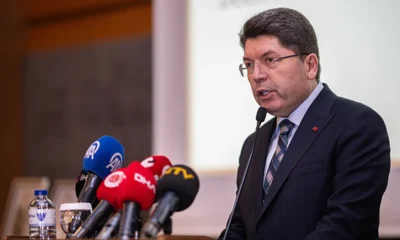
 Daily Agenda1 day ago
Daily Agenda1 day agoMinister of Justice Tunç: “The regulation regarding children involved in crime will come to the parliament after the commission works are completed.”
-
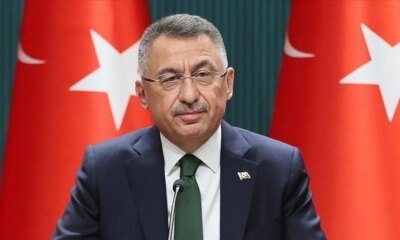
 Daily Agenda1 day ago
Daily Agenda1 day agoParliamentary Foreign Affairs Committee is going to the USA! Fuat Oktay: The constructive attitude of the congress is of critical importance in Türkiye-US relations
-
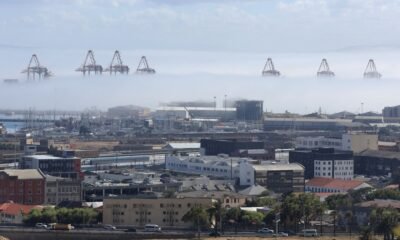
 Economy1 day ago
Economy1 day agoFacing US tariffs, South Africa steps toward trade deal with China
-

 Sports17 hours ago
Sports17 hours agoAkar carries Türkiye’s hopes into Olympic short track spotlight
-
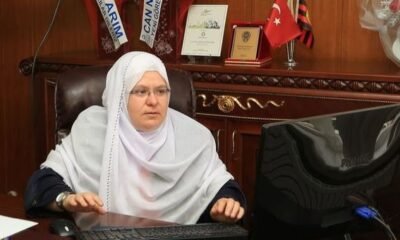
 Politics17 hours ago
Politics17 hours agoArrest, outrage after far-right man targets Turkish mayor’s dress
-
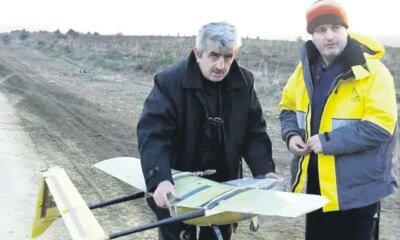
 Daily Agenda2 days ago
Daily Agenda2 days agoA Akıncı passed from this world
-
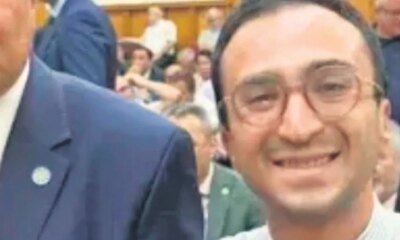
 Daily Agenda21 hours ago
Daily Agenda21 hours agoImmoral and excessive attack on women




